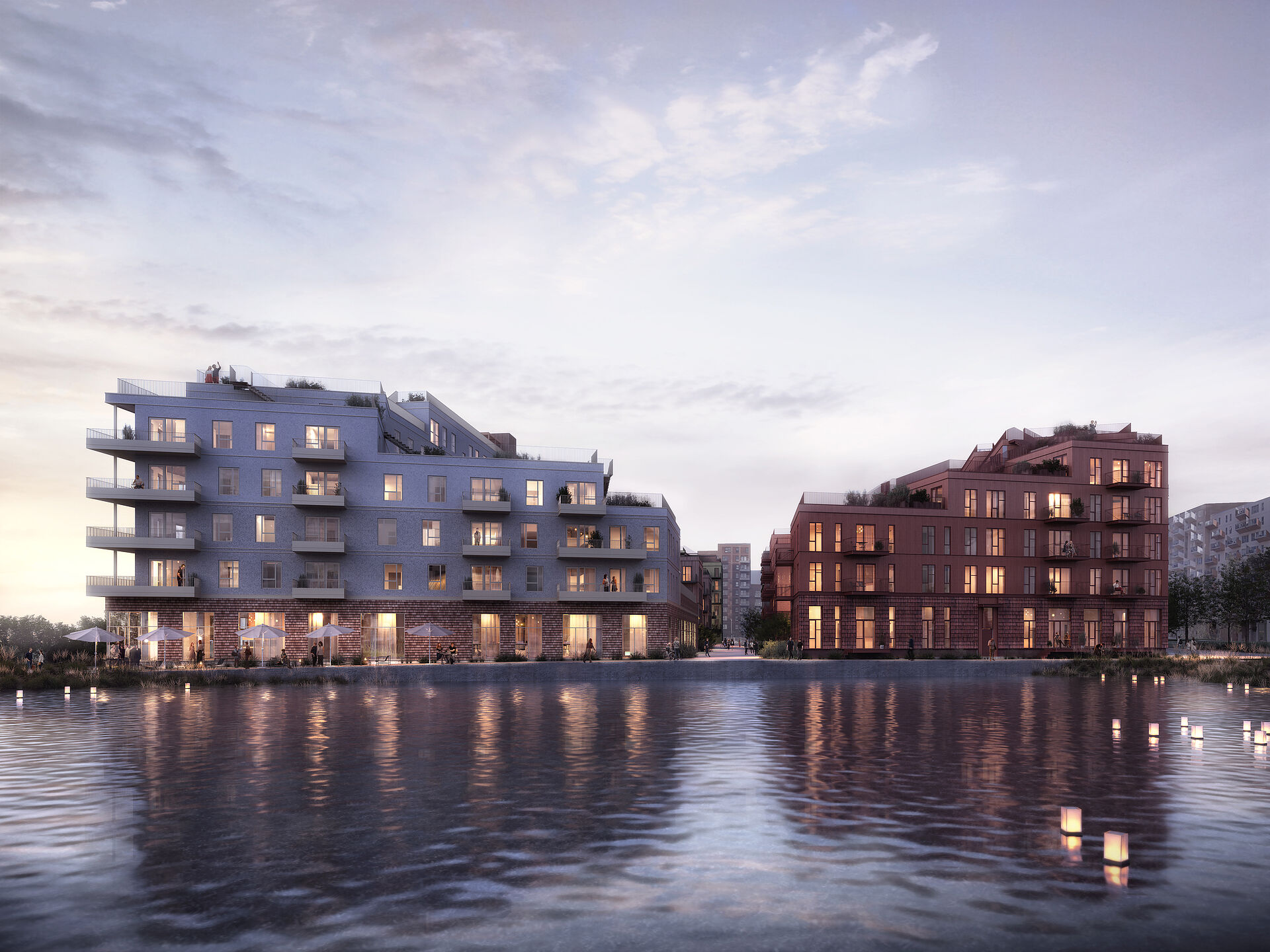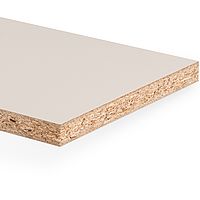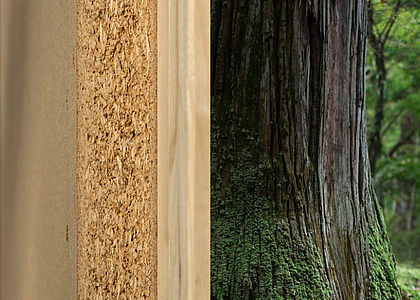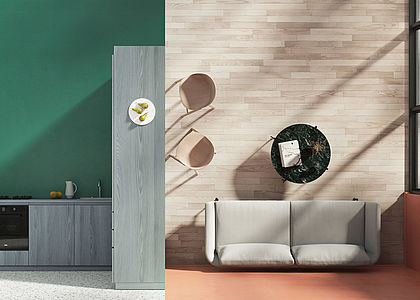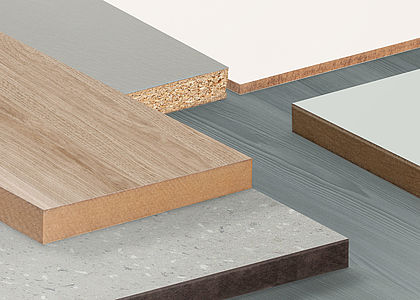Sustainable kitchens for a sustainable new neighborhood
An Experts Project from Rotpunkt Küchen

Thanks in part to Pfleiderer, we had exactly the products that the client requested.

When it comes to particleboard, we have been consistently pursuing the path towards sustainability together with Pfleiderer for years.

Thanks to Pfleiderer, we can also say that we are able to produce furniture in accordance with the UN's 17 goals.
Pfleiderer in conversation with Mr. Andreas Wagner
Pfleiderer: What is the history of Rotpunkt Küchen? What milestones have there been in the company's history?
Andreas Wagner: The day before yesterday was Valentine's Day - and that means that we were founded exactly 94 years ago to the day, on February 14, 1930. There have been many milestones in our long history. The most important one is that we have been an owner-managed and family-run company from day one until now. We finally entered the kitchen production business in the 1950s and have enjoyed continuous growth ever since. Another milestone was our decision to focus on exports. Today, exports account for more than 80 percent of our business, which is unusual for the industry. And we're doing pretty well with that.
Pfleiderer: What are Rotpunkt Küchen's mission and corporate goals?

Andreas Wagner: At some point, I once said that we can't produce the cheapest white kitchen, but we can produce the greenest! Not in terms of color, of course, but in terms of sustainability - and that is one of our most important goals. As Rotpunkt, we want to fulfill our social responsibility with different materials, more material efficiency and innovative ideas - in other words, to be a safe, reliable employer on the one hand and to do something for the environment on the other.
Pfleiderer: How are the sustainability goals and ESG criteria specifically anchored at Rotpunkt Küchen?
Andreas Wagner: It is important to us that our sustainability activities are also verifiable. And they are in various ways: Due to the size of our company, we are obliged to obtain some certifications. We have also introduced an energy management system in which the corporate goals we have just outlined are anchored. Be it the topic of material efficiency, electricity purchasing or the use of photovoltaics. We have around 10,000 square meters of hall space in our new building in Bünde. We will use every available square meter of photovoltaics on the roof to produce some of our own electricity. We are also trying to break new ground in logistics. And there are other activities too: For example, we have an e-bike leasing scheme for our employees. Two thirds of our employees are already using it and when it's not raining cats and dogs, we have around 120 e-bikes in our yard instead of cars.
Pfleiderer: What role do sustainability and environmental compatibility play in the selection of materials and manufacturing processes for your kitchens?
Andreas Wagner: When it comes to particleboard, we have been consistently pursuing the path towards sustainability together with Pfleiderer for years. At the time, BalanceBoard was our entry into the topic on the product side - and we have integrated sustainability much more deeply and massively into our product development in recent years. Environmental compatibility in materials and production does not end with the board. It continues with edgebands. Here too, we have switched production to more sustainable REHAU products, as well as our waste systems, which are largely made from recycled material. And where possible, we also influence the use of recycled products in steel production.

Pfleiderer: The UN17 Village is probably the most ambitious construction project in terms of sustainability in the world at the moment. Can you tell us - in your own words - something about the background and goals of the UN17 Village project in Copenhagen?

Andreas Wagner: Scandinavia is a few steps ahead of Germany when it comes to sustainability. The topic has been taken very seriously there for a long time.And that has consequences for society.If you look at the electric car fleet in Scandinavia, for example, you will see that there are more Teslas and other electric cars driving around than conventionally powered vehicles. This is the major background against which the UN17 Village project in Denmark came about. As a kitchen manufacturer, we were asked whether we could supply the kitchens for the project that would meet the high requirements. Our advantage was that we have been active in Scandinavia for a long time and are well positioned there in terms of sustainability. With our arguments and our verifiable specifications, our DNA and our partners, we were able to win this forward-looking project.
Pfleiderer: Rotpunkt Küchen supplied the furnishings for 536 kitchens.What specific requirements and needs did the planners and developers of the UN17 Village have with regard to the kitchens?What criteria did Rotpunkt Küchen have to fulfill as a supplier?
Andreas Wagner: The clients in Scandinavia wanted to comprehensively address the 17 goals, i.e. sustainability in relation to the environment, but also working conditions and other issues.As a kitchen manufacturer, we have no influence on some of the SDGs, for example overfishing of the oceans.But we do have an influence on others and these were asked about in the open tender for the project. We had to provide a whole range of documentation, but that wasn't a problem for us. As I said, we've been active in Scandinavia for a long time and because sustainability is such an important issue there, we took care of certifications early on that nobody knew about here for a long time. Nordic Swan is one example. The fact that we were able to present this label was a decisive factor, and Pfleiderer also helped us with this. Overall, when it comes to sustainability, we have a package that no one else can offer at the moment.
Pfleiderer: What were the challenges in planning and implementing the kitchens for a project of this size and with such specific requirements
Andreas Wagner: Basically, it was a project like many others for us. There were some special requirements relating to UN17 that only we can currently fulfill. Thanks in part to Pfleiderer, we had exactly the products that were requested by the client.We didn't have to develop anything new and we also had the documentation.In terms of the kitchens themselves, the design in Scandinavia is somewhat cleaner and perhaps not quite as dark as in Germany, France or the Benelux countries.
However, the interior and the movement systems are the same. It was perhaps a little special that we not only supplied kitchens, but also wardrobes. But that wasn't a challenge for us either. We have been active on the Scandinavian market for a long time and the sales situation there is such that not only kitchens are sold in the kitchen studio. You also have to be able to serve other rooms. That's why we've been thinking about bathroom furniture, closets and the utility room for almost 10 years - so that wasn't a problem either. What is always an issue, of course, is that every kitchen is unique because measurements have to be taken in every room. That was also the case with the UN17 Village. But that's also our daily business: we produce on a commission basis in batch size 1 and also produced the kitchens for the UN17 Village in batch size 1. Especially as every household has its own wishes and wants a special worktop, for example. So these 536 project kitchens have actually become 536 individual kitchens.

Pfleiderer: What innovations or special solutions has Rotpunkt Küchen integrated into the kitchens for the UN17 Village?
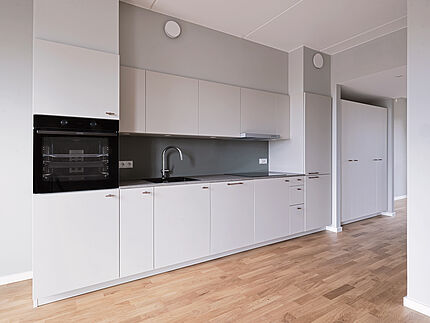
Andreas Wagner: On the product side, the starting point for our application was the Greenline line. The range is based on a low-emission chipboard that we developed together with Pfleiderer and which is manufactured using 90% recycled wood. The "greenline BioBoard Gen2" is just as resilient and workable as a conventional chipboard - but lighter and more CO2-friendly. This board was used in the project.
Pfleiderer: What significance does this project have for Rotpunkt Küchen in terms of branding and the company's reputation?
Andreas Wagner: The UN17 Village is a flagship project - not just for us, but for the entire construction industry. I believe that we will see more of these and similar construction projects in the future. And the fact that we were able to be part of it is a great USP, because no one else in the kitchen industry is currently in a position to deliver something like this. But thanks to Pfleiderer, we can also say that we are in a position to produce furniture in accordance with the UN's 17 goals. 95 percent of our product range has the necessary certifications. In this respect, the project is an accolade, a confirmation of our work to date.
Pfleiderer: How will Rotpunkt Küchen continue to promote sustainability and social responsibility in its projects in the future?
Andreas Wagner: I'll come back to the beginning. I said that we are trying to produce and supply the greenest kitchen. We are now in the process of closing the chain to the end customer. The logistics currently end at the retailer and we now want to integrate our retail partners into our sustainability strategy. We still have a lot of ideas - and some that go beyond the chipboard and edge of the product.

Pfleiderer: Rotpunkt Küchen has been working with Pfleiderer for many years. In your opinion, what characterizes this cooperation?
Andreas Wagner: As a technician, I can best give you a technician's answer: Silence. With Pfleiderer, we have a partnership where we are not constantly sitting around the table talking about quality issues, talking about price issues, talking about new products or talking about a product launch that didn't work. On the contrary: it's reliable in both directions and we both know what we have in common. We work together on a friendly level. It's fun because the team and the products are good. And of course, as in any partnership, there are always things you have to talk about. Then you close the door behind you, sort it out and when you go out, it's peace, joy and pancakes again.
Pfleiderer: Thank you for the interview!
PROFILE ANDREAS WAGNER
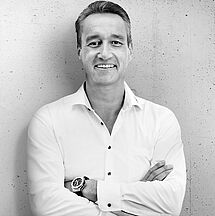
Profession | Managing Director |
| Motto | We at Rotpunkt Küchen are not only wish fulfillers, but also family friends, enablers and world lovers. |
The facts about the project
| Project: | UN17-Village, Copenhagen |
| Product: | greenline BioBoard Gen2 (DecoBoard P2 F****) |
| Area of application: | Kitchen and interior fittings |
| Architects: | Lendager, Sweco Architects |
| Execution: | Rotpunkt Küchen, Bünde |
| Completion: | 2024 |

Products used
INDIVIDUAL ADVICE
Contact
Please contact us directly! We look forward to hearing from you.
Product inquiries and sales.
+49 (0) 9181 28-480
